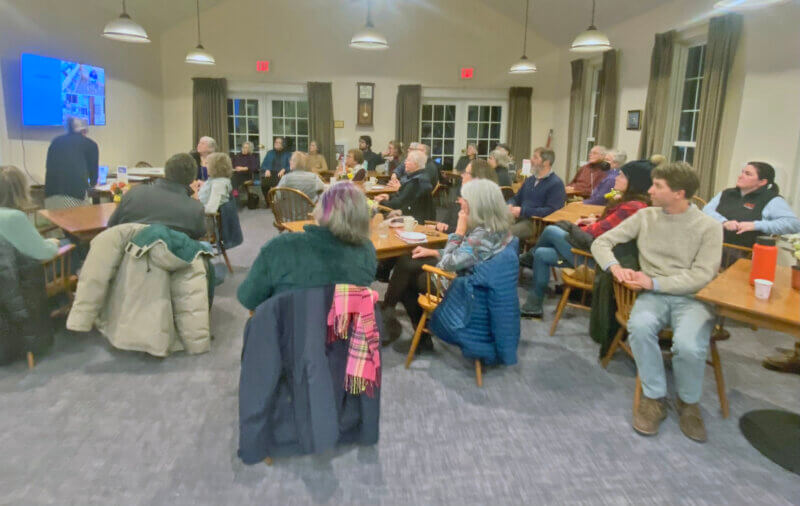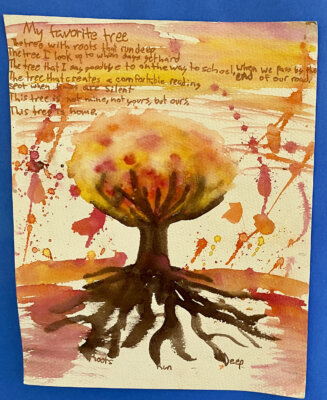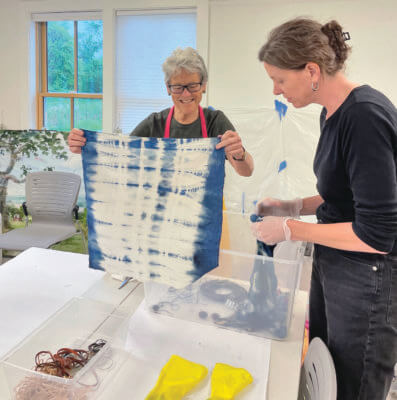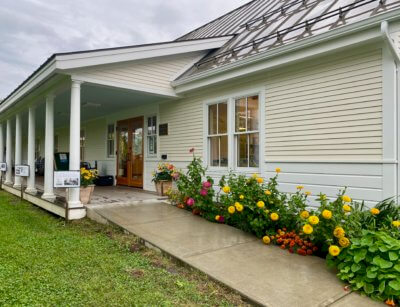Big group shows up to forum about library’s future
Around 55 people showed up at the Charlotte Senior Center to discuss how they would like the library to develop and its role in the community, but much of the conversation was about issues the library can’t do much about — like sidewalks.
The community survey discussion on Thursday, Jan. 18, was part of strategic planning the Charlotte Library is engaged in. It’s the third time the library has gone through this process.
Besides sidewalks, which were also discussed at a village master planning project discussion at the senior center on the Thursday a week before, topics mentioned at the library strategic planning event included: multigenerational affordable housing; a health center; lively villages that aren’t like South Burlington; a public square where people encounter each other more often; library outreach to the underserved; commercial options in the villages like cafés, restaurants and shops; more small diversified farms; transportation options; broader and speedier digital access; more action on the tasks that are listed in the town plan; development that doesn’t add to light pollution; a gym; growth based on the needs of the community; an assisted-living facility that would make it easier for senior citizens to stay in town; broader community access to Charlotte Central School; a more accessible space for the food shelf; more assistance for migrant farm workers; a building for rec programs; a better working relationship between the residents and the town government; more childcare; more programs like the library already runs on the town green, such as performances, concerts and Halloween pumpkin carving; outdoor movie nights on the town green; more sustainability projects sponsored by the library; a newcomers or new parents group; after-school mentoring; longer times to check out online books; and events where people can learn about all the good work happening in town.

As part of the Charlotte Library’s strategic planning effort, around 55 residents showed up at the Charlotte Senior Center on Jan. 18 to discuss how they would like the library to evolve.
The Charlotte Library did this type of strategic planning in 2012 and 2015, library director Margaret Woodruff said. The 2015 planning helped to spur the expansion of the building that was completed in 2020.
Christine Friese, who was the Vermont assistant state librarian, was part of the process in 2012. Friese, who is now the director of the Portsmouth Public Library in New Hampshire, returned to Charlotte to facilitate the process on Thursday.
Although it’s no longer “your grandmother’s library,” Friese said, the first thing that people still think of when they hear the word “library” is books. But libraries have become about so much more than just books that there is discussion about changing the term to something more encompassing of all the things libraries do now.
“When I was in library school, there was a big argument about whether we should get rid of the L word,” she said. In France they have changed the term from “bibliothèque” to “médiathèque.”
There was a good bit of discussion about ways that the Charlotte Library could share info with the public about what it is doing. Almost all the suggestions were things the Charlotte Library is already doing. Unfortunately, it’s a pervasive phenomenon around the country that, despite all that libraries do to try to tell the public what they are doing, people still don’t seem to know.
“All of us in our field feel like we’re doing PR all the time. And yet we have people come to us and say, ‘There’s this new thing at the library. You can download a book,’” Friese said. “Five years ago, a very educated man said to me, ‘Libraries have magazines.’”
Among all the assets the Charlotte Library provides, Jim Hyde noted that it is also an important role model for the community, noting that recently the library staff had a push to increase civility.
“The library basically sets a model of behavior, which we could all aspire to, and I think that’s a really important function for a library to play,” Hyde said.
Although the library doesn’t have much authority over so many of the issues people brought up at the meeting, Friese said she believes the library can help: “The library is not going to be able to fix the housing and the health care and the childcare all by itself, but there could be a role for it.”
Friese quoted Neil Gaiman, who said, “Google will find you 50 million answers to a question, but a librarian will find you the right one.”
In a phone conversation, Woodruff said the strategic planning process is not required by the Vermont Department of Libraries, but it is strongly encouraged.
The data from the discussion and the online survey conducted in the fall will be compiled so the library can see what it can use from the information collected. The survey had been closed, but there was so much interest in it after the forum on Thursday, that Woodruff has reopened it. You can take the survey here.
Friese will meet with the library staff again to help them sort out what ideas rise to the top. Woodruff said they should have news about what they have found out in the spring.
Woodruff expects they will find two levels to the results of the survey and the forum — a sort of 30,000-foot level of the larger role of the library in the community and the very specific ideas some people talked about.
“A lot of the stuff that people were talking about, I don’t know what the library can do,” Woodruff said, but Friese should be helpful in determining what issues the library can help with and where it should “stay in its lane.” Even on those issues, the library might be able to help.
“We’re not going to start building new houses in Charlotte, but we could help facilitate a conversation about that,” Woodruff said. “This is a neutral space where they can come and talk about things like land use or housing.”
Related Stories
Popular Stories
If you enjoy The Charlotte News, please consider making a donation. Your gift will help us produce more stories like this. The majority of our budget comes from charitable contributions. Your gift helps sustain The Charlotte News, keeping it a free service for everyone in town. Thank you.
Andrew Zehner, Board Chair








